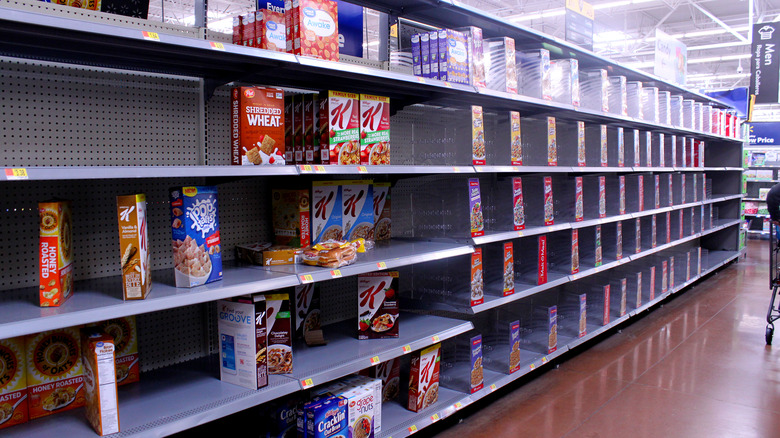The Cereal Shortage May Be Coming To An End. Here's Why
It's been quite some time since we've seen cereal aisles adequately stocked, and especially if you're a Kellogg's loyalist, you've probably already switched to a new brand by now. Between supply chain disruptions and a three month-long Kellogg employee strike, cereal has been in consistently short supply throughout 2021, Eat This, Not That reports. But now the end is finally in sight.
According to an announcement by the Food and Agriculture Organization (FAO) of the United Nations, cereal production is on track to increase by 1.6% within the next year. This small percentage might not seem like that dramatic of an increase, but the FAO explains it's actually a record high due to the most recent harvest season. To produce cereal, manufacturers need foods like corn, sorghum, wheat, and rice, and the supply of these ingredients is directly affected by how fruitful the harvest season has been. For 2022, the forecast is positive, which means cereal production is expected to be up.
Cereal is already getting more expensive
Based on the FAO's announcement, going forward it'll be much easier to get your hands on a box of your favorite cereal. But the bad news is, you'll likely have to pay more for it than what you're used to. Grain production may be higher, but so are the prices.
CNN Business reported in November 2021 that cereal brand General Mills announced an increase in prices of its cereal and packaged goods coming mid-January 2022. Experts expected all grocery prices to be around 8% higher than normal for the first half of the year. As the news outlet explained, this is a result of input cost inflation, due to cereal and other food production experiencing much higher operational expenses since the start of the pandemic. To make up for the losses, General Mills says it had no choice but to raise prices. That means popular cereals like Cheerios, Lucky Charms, Wheaties, and more probably won't be going on sale any time soon. Cereal fans can only hope that other brands won't increase their prices too, but at least they know cereal will no longer be in such short supply.

